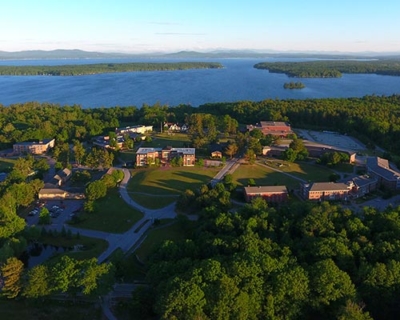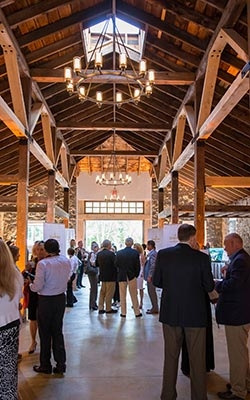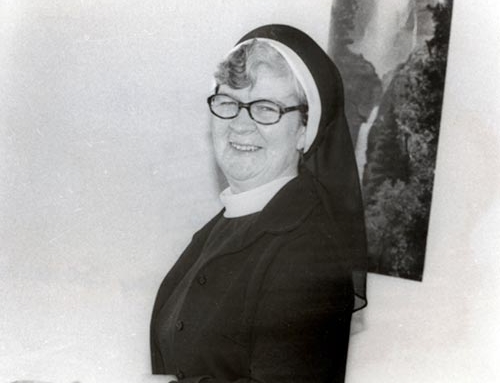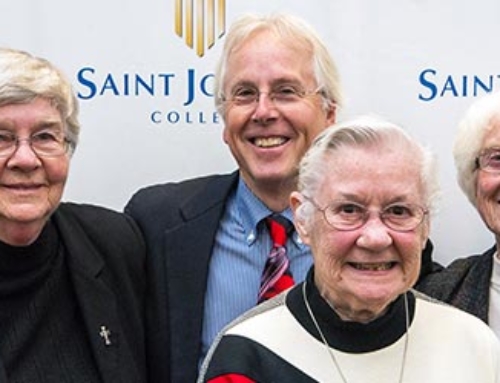 The Saint Joseph’s strategic plan, Sustaining the Promise, positions the College to play a vital role in the future of Maine.
The Saint Joseph’s strategic plan, Sustaining the Promise, positions the College to play a vital role in the future of Maine.
By Ann Swardlick
In 2014, two years after Saint Joseph’s celebrated its centennial, the trustees of the College adopted a new strategic plan,Sustaining the Promise: Toward Saint Joseph’s College’s Second Hundred Years .
An “evergreen” plan, with 5-year detailed and 10-year aspirational windows, Sustaining the Promise envisions Saint Joseph’s future in an entrepreneurial manner. It calls upon the College to use its assets in new ways that align with its mission, promote financial stability, and better serve its students, community, and region.
“Where we are headed in the next decade is, in many ways, a bold, new direction for the College, even as it continues to recognize and respect our traditions and values,” says President Jim Dlugos. “Through a series of innovative, strategic initiatives, we will create a healthy, sustainable ecosystem that will serve as a learning destination for individuals of all ages.”
This vision of a 21st-century learning destination for a more diverse student body has been embraced not only by the College community but also by educators and thought leaders in Maine and beyond, who recognize its potential for positioning Saint Joseph’s to play a vital role in support of Maine’s future.
Sustaining the Promise sets us on a path to becoming an exemplary, 21st-century, Catholic, liberal arts college in the Mercy tradition, acknowledged as leaders in educational program design and delivery, learner-centered education, and contextualized learning.
Mission-Aligned Businesses
A key strategic initiative in our plan is the development of mission-aligned businesses on campus. Designed to provide new learning opportunities for a diverse student body, these businesses will address emerging needs in Maine, and operate as sustainable enterprises producing net revenue for the College.
To guide their development, the College has formed the Mission-Aligned Businesses Advisory Council, an impressive team of thought leaders, business professionals, and officials. Co-chaired by former Maine Governor John Baldacci, and Ron Phillips, retired founding president of Coastal Enterprises, Inc., the Council has two of the state’s most seasoned economic development leaders at the helm.
The Council includes individuals with expertise in each of the target development clusters, as well as members of the College's leadership team and faculty member Mark Green. Peter Nielsen, who recently joined the College as entrepreneur-in-residence, facilitates the work of the Council and manages the development of the businesses. Support for the development of mission-aligned businesses comes from across the College community.
Mission-Aligned Businesses Advisory Council Co-chairs
Gov. Baldacci served two terms as Governor of Maine, from 2003-2011. Prior to that, he served four terms as Congressman in the US House of Representatives. He currently serves as vice chair of the board of the Northeast-Midwest Institute, a Washington-based, private, nonprofit, and nonpartisan research organization dedicated to economic vitality, environmental quality, and regional equity for Northeast and Midwest states.
Ron Phillips retired in March as founding president and CEO of Coastal Enterprises, Inc., a mission-driven lender and investor specializing in rural economic development in Maine and throughout the region. Since its founding in 1977, CEI has leveraged a total of $2.74 billion in financing, along with its private and public partners, to become one of the most well-regarded Community Development Corporations and Community Development Financial Institutions in the country.
Moving Forward
One element of Sustaining the Promise calls for redeveloping the heart of campus to create a more vibrant and compelling learning environment for students of all ages. Here’s a look at some of the progress being made as we begin to implement the strategic plan.
Developing our Lakefront Advantage
Much has been done to make the lakefront more accessible for recreation and events. With an attractive new access way, a permanent event venue in place, wireless Internet access, bathroom facilities, and more, the lakefront was primed and ready for Alumni Weekend activities and several weddings this summer.
These improvements are part of a larger vision to more fully utilize Saint Joseph’s lakefront as a revenue-generating venue. With breathtaking views of Mount Washington and the Presidential Range, across beautiful Sebago Lake, it’s an ideal spot for meetings and retreats, weddings, and events of all kinds.
New Labs in the Science Wing
The addition of four new laboratories and several relocated and renovated labs in the Mercy Science Wing will dramatically increase capacity for teaching and research.
According to Dr. Johan Erikson, chair of the science department, “These new facilities nearly double our laboratory space; I expect to see a significant increase in the number, quality, and diversity of student research projects.”
In a nutshell, here’s what’s in store for next semester:
- A new Advanced Science Lab for organic chemistry and upper-level bio and chemistry majors, with eight protective fume hoods
- A new, dedicated Microbiology Lab, providing a controlled environment for use by nursing and bio students
- A new Instrument Lab, enabling students to do quantitative analysis and develop critical lab skills
- A relocated Anatomy & Physiology Lab and a partially renovated Chemistry Lab
Construction of a fourth new lab, dedicated solely to faculty/student collaborative research, will be completed next year. The much-anticipated Research Lab will allow projects to be set up and left up, facilitating longer-term research.
Baggot Street Café
One of the most exciting changes awaiting the College community is the new Baggot Street Café, named for the Dublin location where Catherine McAuley founded the first House of Mercy in 1827. The expansive café/lounge/meeting space on the second floor of Heffernan Hall will be operated by Stuart Leckie, senior director of sustainable enterprises. It will be open from early morning until late in the evening, beginning sometime this fall.
 The Stone Barn Reborn
The Stone Barn Reborn
With the Shaping Maine celebration on June 23, the Stone Barn entered a new era as an event venue. The century-old restored structure on the Pearson’s Town Farm property is the centerpiece of the College’s vision for developing educational offerings and businesses focused on sustainable agriculture.
According to Peter Nielsen, “We are hoping to transform Pearson’s Town Farm into an integrated set of sustainable agricultural enterprises that will serve as both an educational resource and an innovation hub for the region’s farmers and food producers.”
Join the Conversation
In his remarks during the Shaping Maine event this June, President Dlugos said, “One of the goals of our strategic plan is to become a place of conversation, a place to bring together people of all ages…to really explore the ideas, knowledge, and values that will move our world forward.”
We hope to engage you, our alumni and friends, in this conversation, too. In future issues of the magazine, we will keep you up to date with the progress of our strategic plan.
Read more about the vision, goals and initiatives articulated in Saint Joseph’s strategic plan.



